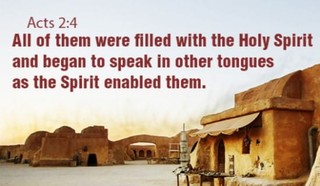- Recent Translations
- All Translations
Acts 2:30
Share
Settings
Acts 2:30 Meaning and Commentary
Therefore being a prophet
Who could foretell things to come, as he did many things concerning the sufferings and death of Christ, and the circumstances attending it, concerning his resurrection, ascension, and session at the right hand of God. So the title of his "Psalms", in the Syriac version, runs thus; the "Book of the Psalms of David, King and Prophet": and in the Arabic version, "the First Book of the Psalms of David the Prophet, King of the Children of Israel". Though the Jews F4 will not allow him, nor Solomon, nor Daniel, to be strictly and properly prophets, they make a difference between prophecy, and the Holy Spirit. They own, that the book of Psalms was written under the influence of the Holy Spirit, but not by prophecy; and therefore they place it among the Hagiographa, or holy writings, but not among the Prophets: though after all, Kimchi allows David to be a prophet, since he is called a man of God; for he says this name is not said of any but (aybn le) , "of a prophet" F5; and Peter is right in calling him so:
and knowing that God had sworn with an oath to him;
as he did in ( Psalms 132:11 ) .
that of the fruit of his loins;
of one that should be of his seed, that should spring from him, even the Virgin Mary, who was of the house and lineage of David:
according to the flesh, he would raise up Christ;
would send him forth, according to the human nature; for this phrase respects not his resurrection from the dead, but his incarnation or exhibition in the flesh, as in ( Acts 3:26 ) ( 13:23 ) . This clause is wanting in the Vulgate Latin, Syriac, and Ethiopic versions, and in the Alexandrian copy, and should be read in a parenthesis; since it is not in the text in ( Psalms 132:11 ) .
to sit on his throne;
on the throne of David his father; (See Gill on Luke 1:32).
F4 Maimon. More Nevochim, par. 2. c. 45. Vid. Procop. Gazaeum in Reg. l. 2. c. 23. sect. 2.
F5 Kimchi Praefat. ad Psalm.

